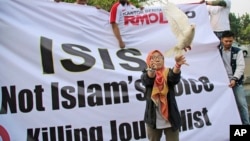Indonesia says it estimates that more than 350 of its citizens are now in Syria or Iraq to fight with the Islamic State, an increase of 50 since last month.
Wawan Purwanto, an expert with the Anti-Terrorism Management Agency (BNPT), said it is hard for the government to keep exact numbers.
"The data is constantly updated, the problem is their IDs are not identical with their aliases, therefore we have to crosscheck them for validation," said Purwanto.
But he added that most of the Indonesian fighters do not come directly from their homeland, but from other countries where they may be working.
"The increased numbers of citizens who went there were not directly from Indonesia, they are long-time residents of Egypt and Yemen. They went directly [to Syria and Iraq]," he said.
He indicated most have been recruited by IS sympathizers in Indonesia who have been categorized as radicals.
Meanwhile, the leader of Nahdatul Ulama, the largest Muslim organization in Indonesia, said he is saddened Indonesian youths could be easily persuaded to join ISIS.
Said Aqil Siradj says he is concerned that the fighters could spread radicalism when they return home, similar to what happened to those blamed for the 2002 Bali bombing.
"This would become a kind of sickness, similar to the sickness when Amrozi, Ali Ghufron, Muchlas and Imam Samudra returned from Afghanistan some time ago," said Siradj.
He urged the government to monitor the IS fighters closely when they return home.
Indonesia has said it is planning to revoke the citizenships of those who have joined IS. Jakarta banned IS in August and moved against known members. Officials have said the radical group contradicts Indonesia’s pluralist state ideology, which is called Pancasila.
This report was produced in collaboration with VOA's Indonesian Service.








